At school I was bad at math. And as you can see in the title, I haven’t improved. But I’ve discovered something. It’s electrifying, life-changing, challenging. And fun. Do you want it too? Actually, it’s not a question of having or not having. Because what I’m talking about is a paradigm shift that will eventually effect each one of us.
We are all part of a new wave. And we have a choice: we can either be drowned by it – or we can learn to surf. I’m for surfing!
First of all, let’s look at the old paradigm.
The old paradigm: The writer is an island
International copyright laws imply that each writer owns clearly defined intellectual property. For our purpose, let’s imagine that this property is an island. Something like this:
Each island is closely guarded. Signs say: “Danger! My words are protected by copyright dogs.”
But who benefits from copyright?
It’s important to realize that the idea of copyright was developed by the printing industry, and not by writers or readers. The history of copyright shows that it is linked to the technology of print.
With the development of the Internet, things have changed. Fast. In fact, we are plunged into a continuous, rapid development.
The new Paradigm: A writer is part of a Collaboration Matrix
According to the Oxford Dictionary, a matrix is a grid-like array of elements; a lattice. On one level, the Collaboration Matrix means that people on the Internet are interconnected. But more than that, it means that we are a brain. Scientist and entrepreneur Jeff M. Stibel wrote an interesting post about the implications of the Internet replicating the brain.
Ok, so if we are a brain – what does that mean?
A brain is a dynamic environment. When two bits of information intersect, an idea is formed. Then the idea triggers radiant thinking. This means that the brain makes countless associations, radiating in all directions. (That’s why mindmaps work). If we are a brain, then we need to connect and form pathways to each other. We need to build upon each other’s ideas and innovations. In this dynamic environment, the ‘writer is an island’ paradigm has no place any more.
Who drives the development of the Internet?
The great revolution on the Internet is the Open Source movement. The key to Open Source software is that it’s free. As Jolie O’Dell says it’s free-as-in-beer and free-as-in-free-to-move-about-the-Internet. Open-Source companies often give away their basic product and then charge customers for support, services or upgraded products. The Open Source movement is gathering momentum. In fact, Open Source proponents are putting a lot of pressure on the US government to use Open Source software.
The basic premise of Open Source is that co-creation fosters innovation.
A great example is the development of WordPress as a blogging platform. Freelance developers have built upon the basic, free WordPress platform, and have created innovative plugins which can turn WordPress into powerful information – or membership systems.
Uncopyright is an initiative inspired by the Open Source movement.
I recently uncopyrighted Goodlifezen.com, following Leo Babauta’s suggestion in a recent podcast we created together. A reader commented: “Copyright is one of those things that brakes the world. I wish more people would follow your example.”
Remember I told you that I discovered something that’s electrifying, life-changing, challenging, and fun? It’s collaboration. Inspired by the Open Source movement, I’ve opened up all areas of my professional life to collaboration.
In the next section I’ll show you my toolbox for collaboration. And then comes the clincher: you can listen to a podcast that Leo Babauta and I made together. Then you’ll understand why I say that 1 plus 1 equals 3!
No Writer is an Island: Tools for collaboration
Let me say straight away that there’s no one tool that covers all collaboration tasks. Or if there is, please let me know about it! At present no one system seems to be able to cope with a variety of different kinds of projects. And with different stages within a project.
Here are some different scenarios:
1. Communicating within groups
Let’s say that you want to foster communication within a group, say, a club or other organisation where members live in far-flung places. How can you do that?
Email
The old way is to use email. I think it’s hopeless for group communication! It just doesn’t work: conversations get tangled up into various streams; people click on ‘reply’ instead of ‘reply to all’ and vital pieces of conversation gets lost. My experience is that group members give up on interactive participation.
Google Groups
This is more structured than email. But the problem is that there is no central repository where information can be retrieved.
Blogs
Blogs are a great way to foster inter-group conversations, especially if everyone has access as a contributor. Downsides are that many people don’t know how to work with blogs, as well as privacy issues.
For the group of Zen teachers, I’ve installed a WordPress blog, using the Wishlist Member plugin for privacy. Wishlist turns a normal WP site into a powerful CMS (content management system). A single license costs $97 – which is quite expensive. But for that you get the software together with exemplary customer service: WishList offer ‘driving instructions’ in the form of twentynine how-to videos, as well as four PDFs that even I can understand – plus a live helpdesk person.
2. Collaborating in small teams
Collaborating with others is what really sets my pants on fire! Because the outcome of collaboration is not a linear addition of each person’s creativity, like one plus one equals two. It’s more like: 1+1=3!
Here are some project stages and how to manage them:
Brainstorm and Action Plan
The first thing you need to do when starting a project is to brainstorm and plan in real-time. It’s important to keep a record of brainwaves, and to finally bring some sort of order into the ideas so that a plan can evolve.
I use Skype for long-distance meetings. In order to record notes, I either use the Skype chat function, or I record the meeting with Audio HiJack Pro. It’s a Mac program and you can use the free version for any audio up to 10 minutes. If you want to record longer audios, the single user license is $32. An equivalent for Windows is Jaksta (which captures both audio and video files). The price 29.95
Instead of Skype, you can also use GoogleTalk voice and video chat.
For brainstorming I use mindmaps on MindMeister in conjunction with Skype. MindMeister is free for up to 3 mindmaps. The great thing about Mindmeister is that you can collaborate in real-time. This means that you and your partner can both add new ideas to the mindmap – and it’s updated immediately. The Mindmeister/Skype combo rocks for brainstorming! (For other mindmapping options, read my post How to Use a Genius Tool for Writers: Mind Maps.)
Project Management
Once your project is underway, it needs to be managed.
A simple way to share and change documents is through Google Docs. It works ok for sharing documents, but isn’t a particularly good tool for project management, as there is no option to group tasks in order of priority, or assign particular tasks to team members.
Leo Babauta has recently introduced me to Basecamp, (price: $24 for 15 projects). We are currently using it for creating the A-list Blogging Bootcamps. I like it a lot! It’s simple, clear and useful. (Read a post on how other people are using Basecamp).
Virtual Classroom
For me the ultimate adventure in collaboration is the use of feedback loops. One way to use a feedback loop is through virtual classrooms.
What is a virtual classroom and how could you use it? Well, imagine that you have enrolled in a long-distance course. The old way was to receive pre-packaged material that’s either rolled out in advance or sequentially. This means that the content is set and can’t be adapted or changed during the course.
The new way is to use feedback loops. This is what Leo Babauta and I are experimenting with in our upcoming A-List Blogging Bootcamps. We are using a triple feedback loop in order to insure that what we teach fits peoples’ learning needs.
- The first feedback loop is the series of 10 audio podcasts, What Bloggers Want to Know which answer questions that Write to Done readers asked Leo about blogging. (Check out the first one here).
- The second feedback loop is a private bootcamp forum where members can ask questions and respond to each other, as well as to the trainers.
- The third loop is a daily live video webinar during the 10 day Bootcamp where members can ask real-time questions and get answers from Leo.
We are going to use Ustream for the video webinars. The sessions will be password protected and also recorded for those who are not available at the time of streaming.
There is a virtual classroom system that I have high hopes for. WizIQ is an Indian development that may revolutionize the way we study at a distance. When a live virtual class is in progress, you can see the presenter in a real-time video, as well as grant voice and even video permissions to participants. That means that you can hand the audio and video control to a participant so that they can be seen or heard by all. You can also show videos, images or written text on a ‘whiteboard’ for all to see. And you can even allow participants to scribble on it – which can lead to chaos!
WizIQ is still in development and there are some bugs that need to be ironed out. But it’s my pick for future collaboration.
Finally, here is Podcast #1 from Leo Babauta’s series “What Bloggers Want to Know”. Leo and I take up the questions that bloggers sent and discuss them. You can listen to it or download it here: http://www.alistbloggingbootcamps.com/what-bloggers-want-to-know-podcast-no-1/
Leo Babauta and I both enjoyed creating the series of podcasts. Because we sparke off ideas in each other. This is what I love about collaboration:
Synergy means that the whole is greater than the sum of parts.
Image courtesy of Pixabay





















